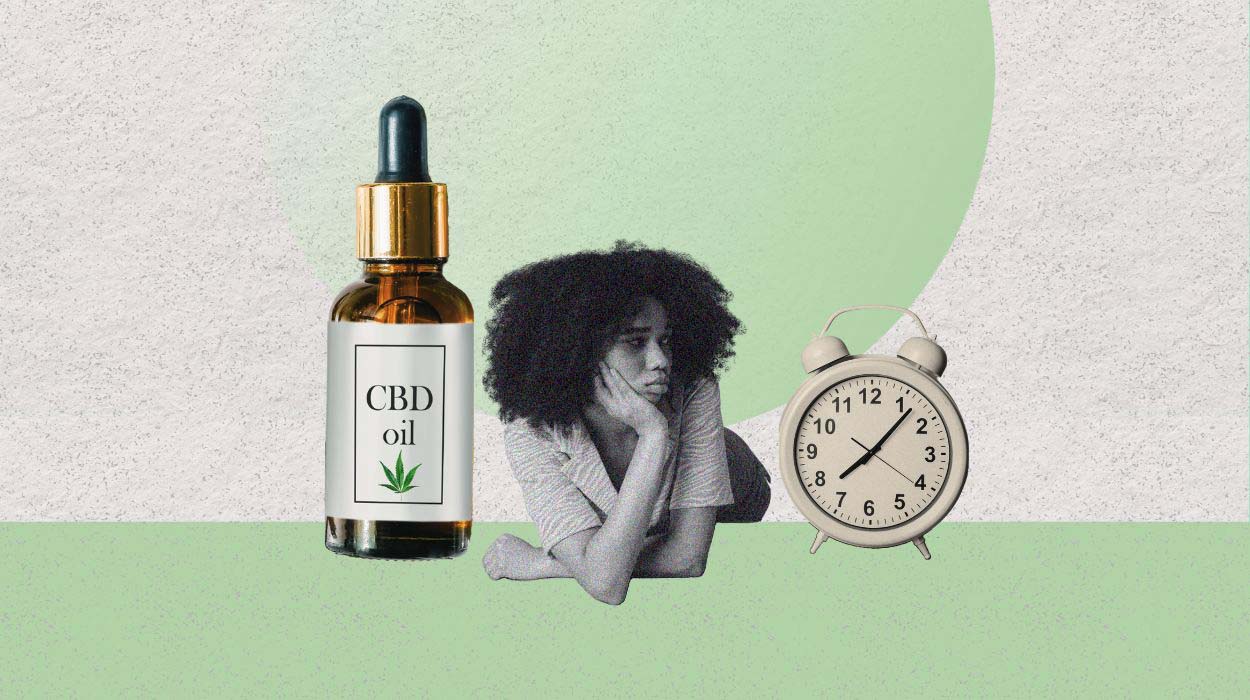 Expert's opinion
Expert's opinion
Expert's opinion
The article is a subjective view on this topic written by writers specializing in medical writing.
It may reflect on a personal journey surrounding struggles with an illness or medical condition, involve product comparisons, diet considerations, or other health-related opinions.
Although the view is entirely that of the writer, it is based on academic experiences and scientific research they have conducted; it is fact-checked by a team of degreed medical experts, and validated by sources attached to the article.
The numbers in parenthesis (1,2,3) will take you to clickable links to related scientific papers.
How Long Does CBD Take To Work? What You May Not Know 2024

Due to a baffling array of choices in CBD products and a whole lot of people jumping on the bandwagon, the CBD trend is here to stay. There are lengthy lists of studies to prove that this natural healer has terrific therapeutic benefits.
But there is also a whole lot of turmoil going around CBD products. But this article is here to explain to you how long it takes for CBD to work and how long CBD will stay in our system. Without any further ado let’s dive into the article.
How Long Does CBD Take To Work?
The rate at which CBD works depends on a multitude of factors such as the method of consumption, body composition, and lifestyle choices of the person using CBD. And the kind of CBD products used, dosage, frequency, and most importantly bioavailability of CBD products also play a crucial role.
The Importance Of Consumption Method Of CBD
There are various methods of consuming CBD, oral administration like ingestion and sublingual, transdermal, inhalation, and topical. Depending on the way you consume CBD, the rate at which it works may vary. Some consumption methods make CBD work faster, while others may take some time before you see the effects of CBD. Here’s a detailed guide on that:
Ingestion
It is the most common method, where a few drops of CBD oil are administered into the mouth. Swallowing prevents the immediate entry of CBD into the bloodstream. Instead, they go into the digestive system and then to the liver. The liver enzymes metabolize CBD products and reduce the concentration. And, only the remainder is sent into the bloodstream. Ingesting CBD edibles or CBD gummies follow the same process, and hence it takes up to two hours for the onset with weaker effects.
Sublingual
This method works by placing a few drops of CBD under your tongue and rubbing it with your tongue for 30 seconds to a minute before swallowing. Sublingual administration is direct and faster than oral. With the help of a mucous membrane, CBD is quickly absorbed into the bloodstream. Effects may be felt in seconds. However, for some, it may take 30 minutes and up to 1-2 hours.
Inhalation
Be it smoking, puffing, or vaping, Inhalation is one of the fastest and most effective modes of CBD consumption. Cannabinoids enter your lungs directly and enter the bloodstream rapidly. CBD dosage reaches its peak within three to five minutes after you consume CBD. Effects last roughly an hour or a little longer.
Transdermal
For a long-lasting dose, a transdermal delivery system works best. Similar to nicotine patches, cannabinoid penetrates the skin and then into the bloodstream, when particularly supported along with permeation enhancers. It delivers the dose consistently over hours. It sets in an hour and effects last for several hours based on the formulation of the patch.
Topical
When a topical CBD product is applied directly to the skin, it gets absorbed and interacts with cannabinoid receptors. Whereas, in some cases, CBD topicals should be applied generously to overcome the low absorption rate of cannabinoids on the skin. CBD topicals will have a peak effect after 90 minutes. CBD topicals are used for pain relief in chronic pain in specific areas only and may not have any other profound effects. Topicals do not get absorbed into the bloodstream. They work locally.
For other methods like CBD edibles, it might take up to 6-8 hours to feel the effects. On average, CBD oil should start working within 6-8 hours. Generally, the effects of CBD may last for 2-6 hours.
Factors That Affect The Rate Of CBD Absorption
As mentioned earlier, the effects of CBD also depend on our body composition such as weight and metabolism. Your lifestyle choices may increase or decrease your working time. Moreover, the effects of taking CBD oil also depend on the amount of CBD used, dosage frequency, potency, and quality of the CBD product used.
Dosage And Potency
It goes without saying that the higher the dosage of CBD, the higher the absorption rate, and the higher the CBD content, quality, and potency, affect the bioavailability of the product. Hemp-derived CBD products do not give an intoxicated feeling, so there’s no need to be cautious about the dosage.
However, it’s highly recommended to use a lower dosage and gradually increase it until you have the desired effects. If CBD is a whole new thing to you, start with 1 milliliter of CBD oil or tincture or a few puffs of smokable CBD whereas, for an edible product go with 10 milligrams.
Bodyweight
Our body weight can influence the metabolism, which in turn, affects the circulation of CBD. The greater the body mass and body fat, the higher dosage of CBD is required to see the benefits of CBD. They also affect how long CBD stays in our system. THC and CBD are stored in fat cells and are slowly eliminated from the body.
People who weigh more have more fat cells, so more CBD is absorbed and stored. So overweight people can expect prolonged effects of CBD. A person of 150-240 pounds should take 15-20 mg twice a day to get the best effects.
Quality
CBD products have carrier oils like MCT oil and hemp seed oil which are considered the best in absorption. Broad-spectrum CBD oil and tinctures are considered the most effective ones. A high-quality CBD oil from a reputable CBD company will mention the dosage and how long it takes for their product to work.
Metabolism
As mentioned above, our metabolism influences how fast CBD is circulated throughout the body. As it controls the time required to break down and synthesize the CBD compounds. It also affects the time it takes to metabolize the cannabinoids and how long it could take for CBD oil to work.
Bioavailability Of CBD
Only 6% of standard tinctures are bioavailable. The bioavailability of CBD is nothing but the rate at which CBD compounds are absorbed into the bloodstream. To increase bioavailability, a new group of liposomal CBD products[1] has emerged. Liposomal nano-emulsified CBD products have an early onset and a 6% higher absorption rate. Look for terms like liposomal, nano CBD, microemulsion, nanoemulsion, water-soluble, and micellized as they have greater absorption.
How Long Does CBD Stay In Our System?
Now, we know all the factors that can influence how long it takes for CBD to work and how long do CBD effects stay. Now let us know how long CBD remains in our system. CBD stays in our system for 2-5 days, but it may vary among people.
As mentioned earlier, excess or unused CBD is stored in fat cells and cannot be used directly by the endocannabinoid system, as it is not water-soluble. It is slowly released into the bloodstream and then into the endocannabinoid system. So, how long it stays in your system depends on the amount of fat you have.
More fat cells, the more CBD they will store, and the longer the CBD stays in your system. The greater the dose, the longer it will stay in your system. Furthermore, methods such as inhaling vaporized CBD can deliver higher levels of CBD and longer it will stay in your system.
CBD Studies
A 2018 review[2] on existing CBD studies reported that the approximate half-life of CBD was about two to five days for those who consumed daily oral doses. Other methods of consumption delivered varied half-lives.
But since you feel the effects of CBD almost immediately through inhalation, this method is a potential pain reliever as it helps CBD to work faster. This study also found that the half-life of smoked CBD was 31 hours.
A systematic review[2] of 24 scientific articles reported that the half-life of cannabidiol was between 1.4 hours to 10.9 hours after oromucosal spray, and 2 to 5 days after oral administration. Whereas, for IV, it was 24 hours and lastly, 31 hours after smoking. And, the bioavailability following smoking was at 31%. No studies attempted to report the CBD bioavailability with other routes.
It takes around 1 week for CBD to be completely metabolized in our body. However, it can take longer for people with excess fat. If you get tested after 1 week, the drug test will mostly turn out to be negative.
Conclusion
So, one cannot precisely say how long it could take for CBD as it depends on various factors. Taking high-quality CBD oil may boost absorption and potency. Always avoid self-medication and consult a doctor before starting CBD. Additionally, make sure that you start with low dosages and gradually move up. Always try to purchase high-quality products with proper labeling.
+ 2 sources
Health Canal avoids using tertiary references. We have strict sourcing guidelines and rely on peer-reviewed studies, academic researches from medical associations and institutions. To ensure the accuracy of articles in Health Canal, you can read more about the editorial process here
- Bruni, N., Della Pepa, C., Oliaro-Bosso, S., Pessione, E., Gastaldi, D. and Dosio, F. (2018). Cannabinoid Delivery Systems for Pain and Inflammation Treatment. Molecules, [online] 23(10), p.2478. Available at: https://www.ncbi.nlm.nih.gov/pmc/articles/PMC6222489/.
- Millar, S.A., Stone, N.L., Yates, A.S. and O’Sullivan, S.E. (2018). A Systematic Review on the Pharmacokinetics of Cannabidiol in Humans. Frontiers in Pharmacology, [online] 9. Available at: https://www.ncbi.nlm.nih.gov/pmc/articles/PMC6275223/.



